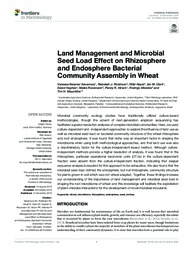Land management and microbial seed load effect on rhizosphere and endosphere bacterial community assembly in wheat.
Land management and microbial seed load effect on rhizosphere and endosphere bacterial community assembly in wheat.
Summary: Abstract: Microbial community ecology studies have traditionally utilized culture-based methodologies, though the advent of next-generation amplicon sequencing has facilitated superior resolution analyses of complex microbial communities. Here, we used culture-dependent and -independent approaches to explore the influence of land use as well as microbial seed load on bacterial community structure of the wheat rhizosphere and root endosphere. It was found that niche was an important factor in shaping the microbiome when using both methodological approaches, and that land use was also a discriminatory factor for the culture-independent-based method. Although culture-independent methods provide a higher resolution of analysis, it was found that in the rhizosphere, particular operational taxonomic units (OTUs) in the culture-dependent fraction were absent from the culture-independent fraction, indicating that deeper sequence analysis is required for this approach to be exhaustive. We also found that the microbial seed load defined the endosphere, but not rhizosphere, community structure for plants grown in soil which was not wheat adapted. Together, these findings increase our understanding of the importance of land management and microbial seed load in shaping the root microbiome of wheat and this knowledge will facilitate the exploitation of plant?microbe interactions for the development of novel microbial inoculants.
Publication year: 2019
Types of publication: Journal article
Unit: Embrapa Environment
Observation
Some of Embrapa's publications are published as ePub files. To read them, use or download one of the following free software options to your computer or mobile device. Android: Google Play Books; IOS: iBooks; Windows and Linux: Calibre.
Access other publications
Access the Agricultural Research Database (BDPA) to consult Embrapa's full library collection and records.
Visit Embrapa Bookstore to purchase books and other publications sold by Embrapa.

